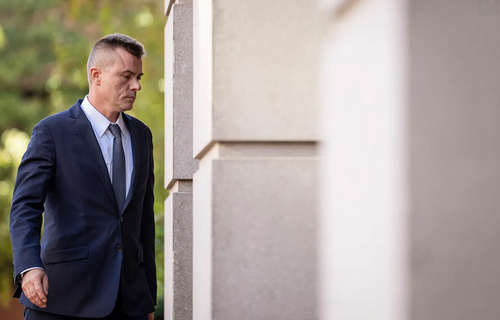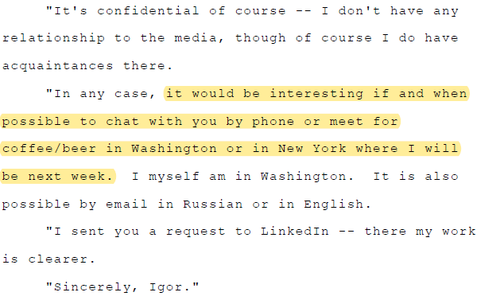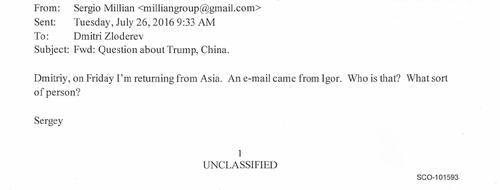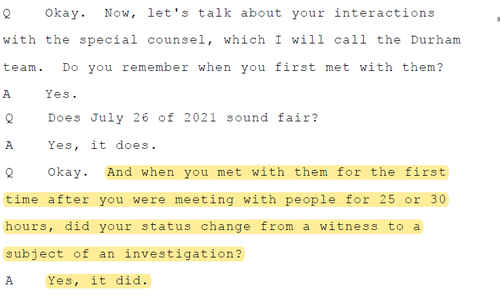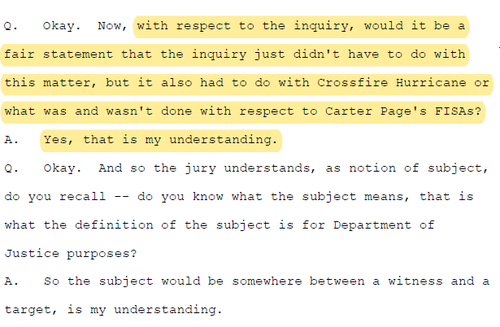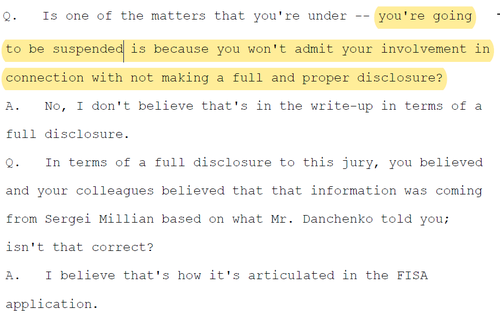“You’re Going To Be Suspended”: The Igor Danchenko Trial – Day 2
Authored by Techno Fog via The Reactionary,
Our article on the first day of the Igor Danchenko trial cut off during the testimony of FBI Supervisory Intelligence Analyst Brian Auten and his discussion of the FBI’s interviews of Danchenko, which started in January 2017.
We’ll resume there – with Special Counsel John Durham’s questions about Danchenko’s purported 10 to 15 minute call with Belarusian businessman Sergei Millian.
Q Just to get everybody back on track, the first day you had said that he had sent two emails, no response, and then got an anonymous call from somebody speaking with a Russian accent and it was male, correct?
A That is correct.
Q Do you recall, sir — with respect to what it is that Mr. Danchenko said, did he say what kind of telephone facility he received the call on, that is, a hard line? A cell phone? Do you recall?
A My recollection is he said a call.
What did Millian purportedly tell Danchenko during that call? According to Auten:
He had talked about a relationship between – with the Trump campaign and Russia and issues involving, I think, kind of whether or not there was any relationship and a kind of — I don’t think he used the term “well-developed conspiracy” in that, but it was along those lines.
Auten was then asked about the documents that Danchenko provided to the FBI. Auten testified that he was provided a single e-mail chain. In fact, there were other e-mails that “Mr. Danchenko had sent to Mr. Millian” that Auten hadn’t seen up until his preparation for trial. (The importance being Danchenko’s concealment from the FBI.)
Moving on, Durham asked Auten about a LinkedIn message sent from Danchenko to Millian. This e-message proposed a call or a meeting in Washington or New York:
Danchenko’s request for a “call” is particularly important since it was made after he supposedly received that 10 to 15 minute call from someone he thought was Millian. This supports the prosecution’s theory of the case: the call from Millian to Danchenko never happened. Danchenko invented the call so that he could provide cover for his real source (Democrat Charles Dolan).
Durham then introduced an e-mail from Millian to an acquaintance, sent five days after Danchenko reached out. Here it is in full:
Durham then used that e-mail to focus on the FBI’s lack of effort to corroborate Danchenko’s claim about Millian. FBI Analyst Auten admitted he hadn’t seen that e-mail until recently, and that the FBI didn’t even check Millian’s travel records during that period of time.
Q Now, with regard to that email from Millian to Zloderev, you didn’t have occasion to see that prior to being shown this document recently?
A No.
Q With regard to Millian saying that on Friday he’s returning from Asia and the like, do you know whether you or other members of your group had ever retrieved Millian’s travel records to see if he was even in the United States on — in the latter part of July 2016?
A I don’t recall that.
Q Would it surprise you to learn that he wasn’t even in the United States?
A I mean, he says he’s in Asia.
Continuing with the theme of purposeful FBI incompetence, Durham asked Auten if the FBI had translated communications between Danchenko and an associate of Millian. These documents were provided to the FBI by Danchenko in January 2017. Auten responded “I’m not aware if it was translated.”
Auten was also asked about other Danchenko communications with associates of Millian. There were introduced to establish that Danchenko never received that mysterious call. A key excerpt:
Auten and the FBI, however, chose to remain ignorant and never obtained these communications. Durham had Auten run down the reasons why they would have been important:
Q Yesterday you told the jury that in meeting with Mr. Danchenko, there were two things that you were interested in, correct?
A Correct.
Q One of them was corroboration of information in the dossier?
A Correct.
Q And the second was sources of information?
A Correct.
…
Q Would those have been significant to you?
A Yes.
Q Why would they have been significant to you?
A It would help us to better understand exactly how the course of information went that was in the reports themselves.
Q Would it have been of any import to you to know in evaluating whether an anonymous call had come in to see the content of the emails from July 21st and then August 18th concerning Mr. Millian not having responded?
A Yes. I mean, all of those emails would be very helpful to understanding the full extent of communications between the parties.
…
Q Because if the written record in the defendant’s own words was that he never responded, wouldn’t that be of assistance in evaluating his reliability concerning whether or not he had gotten this call he supposedly had gotten?
A It would be helpful, yes.
Durham continued pressing Auten about why analyzing these communications would have been important. There was this key exchange on whether these e-mails, which Auten said were “significant,” could have influenced the FBI. Pay attention – it’s Auten hedging when confronted with his own failures.
Q Would it have the capacity or the ability to have influenced steps taken or not taken by the FBI?
A Possibly, yes.
Q Possibly?
A Well, again, I’m an analyst, not an investigator. So in that sense, it would be very helpful from an analytical side to understand the full extent of communications between the parties.
Direct examination then moved on to Auten’s knowledge of Charles Dolan. (Background on Dolan here.) During Auten’s overseas interview with Christopher Steele in October 2016, Dolan’s name had come up:
Q And did you tell the jury yesterday that separate and apart from sources, you had gotten three names from Mr. Steele as to persons who might be knowledgeable?
A Yes.
Q Was Charles Dolan one of those names?
A Yes.
However, from October 2016 through January 2017, the FBI hadn’t put together – or, hadn’t properly investigated – whether Dolan was a source for information in the Steele Dossier. Then there’s this remarkable admission from Auten. Although they were interested in Dolan, they didn’t raise this issue with Danchenko.
Q By January of 2017, do you recall what information the bureau was interested in relating to Mr. Dolan?
A From my recollection, we had done some preliminary looking, and it was at that stage — I don’t recall. There was a lot being done.
Q Okay. So my next question, then, to your recollection, did you or Mr. Somma raise Mr. Dolan’s name with Mr. Danchenko?
A Not to my recollection, no.
Durham also asked Auten about Danchenko’s lack of transparency about using Dolan as a source. Danchenko never offered Dolan’s name.
Q Tell the jurors what your recollection is in that regard.
A My recollection is asking if there were any additional individuals that we haven’t talked about in this interview that would be sources of information for the dossier.
Q And is that clear in your mind?
A Yes. I documented it in the EC.
Q No doubt that you were asking Mr. Danchenko if there were any other sources you can tell us about, correct?
A That’s my recollection.
Q Charles Dolan’s name was not brought up?
A No.
From there, a series of e-mails between Dolan and Danchenko were presented to Auten. These e-mails showed Danchenko begging Dolan for information on the Trump campaign, and Dolan obliging. Auten hadn’t been given these e-mails by Danchenko. And they were significant, as they showed the flow of information and how Danchenko thought his and and Dolan’s interests converged – because they both were assisting, in their own way, the Democrat candidate for President.
Auten then discussed his time with Special Counsel Mueller’s team.
Q And then when Crossfire Hurricane transitioned into Director Mueller’s inquiry, did you remain with the project, or did you go elsewhere?
A No. I remained and went with Special Counsel Mueller.
…
Q In that connection, at any point in time after January 2017, whether you were part of the Crossfire Hurricane group or had evolved into Mr. Mueller’s inquiry, did you continue to be involved personally in matters relating to Mr. Danchenko and his sources?
A Yes.
However, one name that was provided by Danchenko was that of Olga Galkina. Auten and others had gone to interview Galkina in Cyprus in August 2017 – during Auten’s time with Special Counsel Mueller.
After that interview, Auten passed questions on to FBI Agent Kevin Helson, who had become Danchenko’s handler, after Danchenko was made to be a confidential human source. (Convoluted, I know.) Specifically, those questions were about Charles Dolan.
Q And do you recall with respect to the subject matter of the question or questions that you asked Mr. Helson to pose to the defendant, what were those about?
A Those were about — I think there were questions about Mr. Dolan. I believe there were questions about other aspects of things that Ms. Galkina had talked about that we wanted clarification on.
Q With respect to the questions that you asked Mr. Helson to ask of Mr. Danchenko, to your knowledge, are those questions then put to Mr. Danchenko?
A That is my understanding.
Unfortunately, Auten didn’t know the responses to those questions. Agent Helson, whom we expect to testify, might have that information.
Cross-Examination by Danchenko’s Attorneys
The cross-examination – our summary of which will be brief – started with Auten’s previous statements to the Inspector General about Danchenko. During the IG’s investigation, Auten had given “a number of positive statements regarding Mr. Danchenko.” He had also made positive statements to Congress about Danchenko – testimony Auten still stands by (if only because he’s dug himself into a hole):
“I believe the primary sub-source was being truthful about who his sub-sources were. I don’t think he was fabricating sub-sources.”
However, after Durham was appointed, Auten became – and apparently remains – a subject of the investigation:
Danchenko’s defense was effective when asking about Auten’s impression of Danchenko at the time of the interview. Auten thought Danchenko was “trying to help.” And Auten admitted that he and Stephen Somma didn’t necessarily want to conduct a thorough interview of Danchenko at the time, thus explaining why they didn’t demand documents or ask about every allegation in the Steele Dossier. They also laid the groundwork for the defense that Dolan wasn’t necessarily a “source” for Danchenko, in that Dolan relied on some open source articles when relaying information on the Trump campaign.
The defense also spent a good deal of time discussing Millian’s various phone numbers and the possibility that he (or the person Danchenko “thought” was Millian) used an App like Skype, WhatsApp, Wickr, or Telegram to contact Danchenko. The flaw? Danchenko’s e-mails to Millian requesting to speak over the phone or meet – after the alleged call.
Redirect by Durham
Durham again focused on Auten and the Crossfire Hurricane Team’s efforts to corroborate Danchenko’s statements. Auten’s testimony was an admission of how little they did, ignoring both travel records and phone records.
There were further details on Auten being a “subject” of an “inquiry.” The investigation into Auten – who is a subject, not a target – has to do with the Danchenko matter and also Crossfire Hurricane and the Carter Page FISAs:
Durham also raised a good point about the believability of Millian, a vocal Trump supporter, calling Danchenko to provide insider dirt:
Q. So would you find it peculiar that somebody who had never spoken to Millian, Millian never spoken to him, would be telling somebody he doesn’t know about a, quote, well-developed conspiracy of cooperation, between The Trump Organization and Russian leadership?
A. I mean, I would say that is peculiar, yes.
Q. That is very peculiar, right?
A. Yes.
Q. Almost unbelievable, wouldn’t you say?
A. I don’t know if I would say “unbelievable,” but I would say “peculiar.”
Things got testy towards the end of Auten’s testimony, indicating Durham’s general irritation with Auten’s conduct in Crossfire Hurrican and his waning patience with Auten as a witness.
Q. Right. So when he — Mr. Danchenko told the FBI he received this call from somebody he believed to be Millian, isn’t it, in fact, true that you took that to mean that that information from the report had come from Millian based on what the defendant told you?
A. No. I think we believed at the time that we weren’t clear and that we would have other opportunities to talk to him about that as well.
Q. Okay. So what you are telling this jury is that you all then took information from the affidavit or from the dossier report and put it in an application to a FISC and you thought – . . . Is that what you’re telling the jury?
A. Again, as an analyst, I am not involved in putting together the application in a FISA.
It continued – with Durham straight-up telling Auten he was going to be suspended by the FBI. (Leading us to believe any charges against Auten are unlikely. Not impossible, but unlikely.)
Then Durham’s near-mocking of Auten’s investigative decisions.
Q. And is there some particular reason why experienced FBI personnel wouldn’t go and look to see what the phone records reflected?
A. Again, you would have to talk to somebody that was in the investigative side of things. I — as an analyst, I can’t — I can’t ask for phone records. That has to be –
Q. You want this jury to believe that analysts don’t participate in investigative decisionmaking?
A. Analysts participate, but analysts aren’t the ones that are going to make the decision to go out and actually get phone records or obtain NSLs or the like.
Q. Can you think of any good reason — not any reason, but any good reason not to have gotten those records and analyzed them?
A. No.
Q. Do you believe whether — with respect to this information, if people were much too ready, willing, and able just to accept it?
A. I don’t know if I would articulate it that way.
Q. Well, you didn’t have any corroborative evidence, correct?
A. Correct.
That about wraps it up with Auten – and with the second day of trial.
The next witness? Tomorrow starts with Charles Dolan.
Tyler Durden
Thu, 10/13/2022 – 17:40
via ZeroHedge News https://ift.tt/X6fmEHC Tyler Durden
